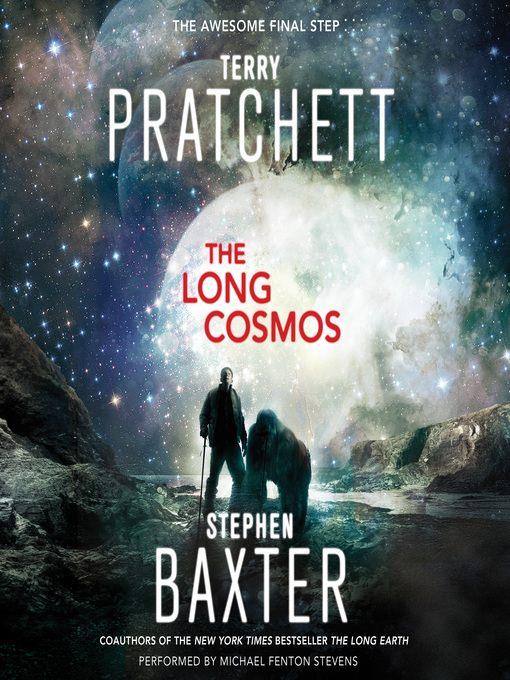
The Long Cosmos
The Long Earth Series, Book 5
فرمت کتاب
audiobook
تاریخ انتشار
2016
نویسنده
Michael Fenton Stevensناشر
HarperAudioشابک
9780062297402
کتاب های مرتبط
- اطلاعات
- نقد و بررسی
- دیدگاه کاربران
نقد و بررسی

July 11, 2016
In this conclusion to the Long Earth series (following 2015's The Long Utopia), set in 2070, Baxter (Ultima) and the late Pratchett (The Shepherd's Crown) take their decades-spanning tale of an infinite chain of parallel Earths to the next level as a mysterious signal from the far reaches of the galaxy urges humans to "join us." While the ultra-intelligent subset of humans known as the Next build a continent-sized supercomputer on a distant Earth to further decipher the message, the famous explorer Joshua Valiente takes a sabbatical far from home, which leads him to an eye-opening encounter with nomadic trolls. Eventually Joshua joins the crew of humankind's inaugural interstellar mission and discovers just what lies at the heart of the galaxy. The story starts off slowly, but it quickly picks up speed as the mystery deepens and the myriad threads come together. There's a definite sense of mortality, but also a sense of wonder as the characters embrace the vast unknown in what might be considered the perfect allegory for Pratchett's final years. It's a wholly satisfying conclusion to the series, though vast amounts of potential remain in the concept. Agent: Christopher Schelling, Selectric Artists Literary and Talent Management.

Narrator Michael Fenton Stevens delivers this final book in the Lost Earth series with a feeling of familiarity. The phenomenon of "stepping between parallel earths" is now in its sixtieth year. As the galaxy continues to broadcast its message--"JOIN US"--the intrepid travelers continue their explorations and contemplations of the meaning of life. Although this series is not imbued with the level of irony and dry humor of Pratchett's renowned Discworld series, Stevens doesn't neglect the flashes of humor that are present as he portrays the fine-tuned relationships between the characters. J.E.M. © AudioFile 2016, Portland, Maine

February 1, 2016
In this definitive-sounding work, completed 18 months before sf legend Pratchett's death in March 2015, the hyperintelligent post-humans called the Next receive instructions about building a giant artificial intelligence known as The Machine. With a 50,000-copy first printing.
Copyright 2016 Library Journal, LLC Used with permission.

May 1, 2016
Final installment of the series (The Long Utopia, 2015, etc.) wherein Earth is one of an indefinite sequence of worlds occupying the same space but separated by some higher dimension (one can almost hear Pratchett murmur, "Nobody knew for certain, but it was probably quantum"). This Long Earth, discovered by people with a natural ability to step between worlds, was opened to everybody by means of a simple device. The only constraints are that most people suffer debilitating nausea with repeated steps and that it's impossible to carry iron from world to world. Also, there are no other humans anywhere, though there are sapient beings--singing, gorillalike trolls, belligerent, doglike beagles, and so forth. By the year 2070, airships equipped with rapid-step devices ply the trade and passenger routes between worlds. Far from the original, or Datum, Earth (devastated by a vast volcanic explosion and partially abandoned), the post-human Next, who generally hold ordinary humanity in contempt, pick up a radio signal from the center of the galaxy--a signal that somehow resonates with the trolls and other nonhumans and whose message is simple yet devastating: "Join us." Embedded in the message are instructions for constructing a huge artificial intelligence, but to build it the Next will need the cooperation and active assistance of all the industrialized worlds. Elsewhere, readers will be reacquainted with familiar parties such as Joshua Valiente, one of the original natural steppers, Lobsang, the ubiquitous AI who invisibly runs things, and retired churchman Nelson Azikiwe. Once again, the purpose is less to tell a story than to discover and explore, in both physical and philosophical senses, an infinite landscape of infinite possibilities. And series fans seem OK with the less-than-compelling narrative and not-especially-engaging characters. Scientist Baxter's naturally rather pedantic and dispassionate tone needed more of the warmth and wit of the late fantasist Pratchett (who died in 2015).
COPYRIGHT(2016) Kirkus Reviews, ALL RIGHTS RESERVED.

























دیدگاه کاربران